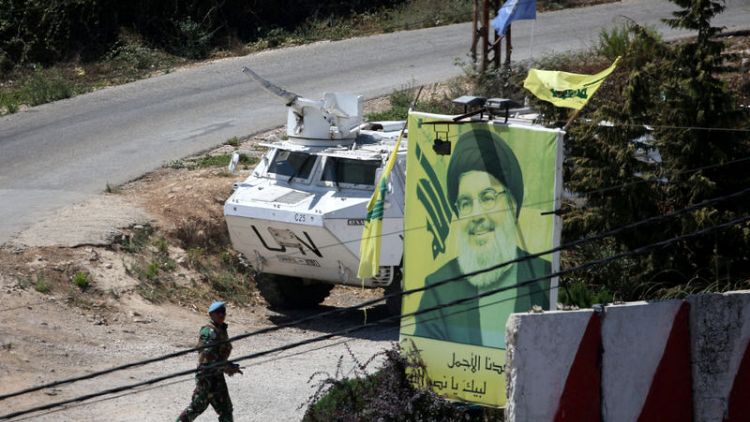BEIRUT/JERUSALEM (Reuters) - Lebanese farmers and residents of Beirut suburbs hit by drones at the weekend vowed on Monday to stand their ground in the event of any Israeli attack, amid heightened tensions between the Iran-backed Hezbollah movement and Israel.
Two drones crashed on Sunday in Beirut's southern suburbs, which are dominated by the heavily armed Hezbollah, prompting the group to warn Israeli soldiers at the border to await a response. President Michel Aoun on Monday likened the drone strikes to "a declaration of war".
Although Israel has not claimed responsibility for the Beirut attack, Hezbollah leader Sayyed Hassan Nasrallah described it as the first Israeli attack inside Lebanon since a one-month war his movement fought with Israel in 2006.
Workers harvesting okra near the border with Israel in southern Lebanon struck a defiant tone on Monday.
"Those who attack us, we are standing ready waiting for them," said Abou Jamil, a sesame seeds farmer.
Hassan Chalhoub, whose balcony in the Lebanese village of Kfarkila overlooks the border, said he was confident that Hezbollah was stronger than before and would protect the south.
"Times have changed," he said.
The building of a Hezbollah media centre in the southern Beirut suburb of Dahyeh had its glass windows blown out by one of the two drones when it exploded.
Mohamad Sarawan, who runs a barbershop next to that building, said he had not left his home in the 2006 war and he would also not "run away now".
His customer Firas Darwiche said he would also stay put. "At the end of the day... we die with our heads held high."
The Dahyeh suburb was left in ruins after the 2006 war, in which 1,200 Lebanese, mostly civilians, and 158 Israelis, mostly soldiers, were killed.
ISRAELI RESIDENTS UNFAZED
U.N. peacekeepers patrolled the streets in armoured vehicles near the border in Lebanon on Monday as usual, and residents said Israeli jets cruised over the border towns.
Israel's military said its northern command, responsible for the borders with Syria and Lebanon, was on elevated alert.
A Reuters cameraman in the Israeli-occupied Golan Heights saw a fresh deployment of Israeli artillery as well as the usual armoured forces, including tanks, that are stationed in the north and guard the frontier lines, with soldiers preparing shells and other equipment.
While soldiers remained vigilant on the Golan Heights, Israeli holidaymakers went rafting down a stream on the plateau where Israel and Syria fought wars in 1967 and 1973. No special alert has been declared for civilian communities in the north.
"I don't really feel the (tension) here in the border. We live normally, we have fun, we go to the river," said Oz Shachari, 25, a baker in the northern town of Kiryat Shmona.
Yaniv Elhadif, 44, said he lived near the border fence and had got used to bouts of tension: "We are not afraid, we are aware. They're constantly provoking us... So we're always with one ear and one eye open."
(Reporting by Ellen Francis, Issam Abdallah, and Imad Creidi in Beirut, Karamallah Daher in south Lebanon, Jeffrey Heller in Jerusalem and Rami Amichay in Kiryat Shmona; Editing by Gareth Jones)
